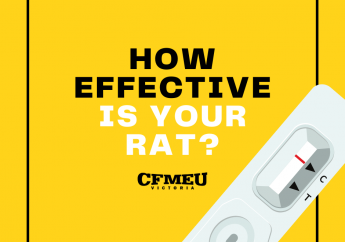Published: 10 Feb 2022

This advice is for delegates, OHS Reps and members seeking advice on the effectiveness of COVID-19 rapid antigen tests (RATs).
Employers have a legal duty to keep workers safe from COVID-19 infection as far as reasonably practicable. Part of this duty includes the provision of RATs. RATs provided to workers must be approved by the Therapeutic Goods Association (TGA).
The TGA has approved many different tests that are now available on the market. Each test varies in performance – some are much better at detecting COVID-19 infection than others.
A set of standards has been created to help employers, workers and consumers determine the effectiveness of their test. The TGA places RATs in three categories:
HSRs, workers and employers should use these standards to make an informed assessment of test results and take further action if necessary. For example, if a negative result is produced through an ‘acceptable sensitivity test’ while COVID-19 symptoms are present, the person who took the test may wish to take an additional PCR test.
The OHS Act demands the highest level of protection be provided against risks, including exposure to COVID-19. Make sure your RATs are the best quality possible.
If your employer is not supplying RATs, or you are concerned about the quality and effectiveness of the tests provided, contact your HSR or the CFMEU OHS Team. If you think you may have contracted COVID-19 at work, contact the CFMEU’s in-house Workplace Injury Lawyer, Celeste Shambrook, on 0491 690 865.
Sources and further reading: